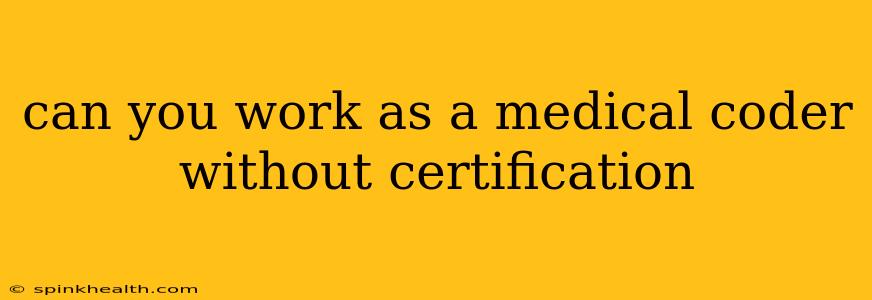Can You Work as a Medical Coder Without Certification? The Unexpected Journey of a Coding Career
The world of medical coding can seem intimidating, a fortress guarded by certifications and complex medical terminology. But the question, "Can you work as a medical coder without certification?" isn't a simple yes or no. It's a story with twists, turns, and a final destination that depends heavily on your individual path.
My own journey into medical coding began with a deep fascination for the intricate details of healthcare – a fascination that far outweighed my initial apprehension about the certification process. I dove headfirst into the world of ICD-10 codes and CPT procedures, driven by an intense curiosity rather than a formal qualification.
This path, while unconventional, wasn't without its challenges. I started by volunteering at a local clinic, offering to assist with administrative tasks. This hands-on experience, though unpaid, proved invaluable. I observed seasoned coders at work, soaking up their knowledge like a sponge. Slowly, I began to understand the flow of patient information, the nuances of medical documentation, and the crucial role of accurate coding in healthcare reimbursement.
What are the challenges of working without certification?
This leads us to the heart of the matter. While you can find entry-level positions in the medical billing and coding field without formal certification, the path is significantly steeper and more limited.
-
Limited Job Opportunities: Many employers, especially larger healthcare systems and hospitals, require certified coders. They view certification as a guarantee of competency and a safeguard against coding errors. Without it, your job prospects will be considerably narrower, often confined to smaller practices or entry-level roles with less responsibility.
-
Lower Pay: Certified coders command higher salaries due to their demonstrated expertise. Without certification, your earning potential will be significantly lower.
-
Steeper Learning Curve: You'll need to dedicate more time and effort to mastering the intricacies of coding. Certification programs provide structured learning paths and mentorship opportunities that significantly expedite the learning process.
-
Higher Risk of Errors: Medical coding is incredibly detail-oriented. Errors can have serious consequences for both the healthcare provider and the patient. Certification ensures you’ve been rigorously trained to minimize these risks.
What are the alternatives to formal certification?
So, is certification an absolute necessity? Not entirely. There are alternative paths, but they require significant dedication and self-discipline:
-
On-the-Job Training: Some healthcare facilities offer on-the-job training, allowing you to learn while working. This path is rare and usually requires prior administrative experience in a medical setting.
-
Extensive Self-Study: You can learn coding through online courses and self-study, but this requires exceptional self-motivation and discipline. You'll need to rigorously test your knowledge and find ways to gain practical experience.
-
Associate's Degree in Medical Billing and Coding: While not a certification itself, an associate's degree provides a more structured educational foundation and might lead to some entry-level positions.
Is certification worth the effort?
In my experience, the answer is a resounding yes. While the path without certification is possible, it's significantly more challenging. Certification demonstrates competency, enhances credibility, opens up more job opportunities, and leads to significantly better compensation. The effort and investment are worthwhile in the long run, offering a far more secure and rewarding career.
Can you advance in medical coding without certification?
While advancing without certification is possible, it's significantly more challenging. It typically requires exceptional performance and a willingness to continuously upskill. Most advanced roles, such as coding supervisor or specialist, usually require some form of certification.
My unconventional start taught me the value of perseverance and the importance of practical experience. However, I eventually pursued certification, recognizing its immense benefit in terms of career advancement and professional credibility. The extra effort was undoubtedly worth it. Ultimately, the decision of whether to pursue certification before entering the field is a personal one. But understanding the challenges and alternatives can help you chart the most effective course for your own career journey.

